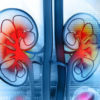Heartburn Treatment Near You in New Jersey
 Many people have experienced the uncomfortable burning sensation that develops after a spicy or processed meal. This sensation, called heartburn, does not actually affect the heart. Instead, it is caused by stomach acid flowing upward into the esophagus. Bergen Medical Associates provides heartburn treatment at state-of-the-art facilities in New Jersey. Its team of 40 board-certified practitioners includes leading gastroenterologists who help patients find lasting solutions to stomach conditions.
Many people have experienced the uncomfortable burning sensation that develops after a spicy or processed meal. This sensation, called heartburn, does not actually affect the heart. Instead, it is caused by stomach acid flowing upward into the esophagus. Bergen Medical Associates provides heartburn treatment at state-of-the-art facilities in New Jersey. Its team of 40 board-certified practitioners includes leading gastroenterologists who help patients find lasting solutions to stomach conditions.
What Is Heartburn?
Heartburn occurs when the esophageal sphincter does not close correctly. This allows partially digested food and stomach acid to flow up into the esophagus. Stomach acid is a fluid produced by glands in the stomach. It works to break down food into small particles, making nutrients easier to absorb. It also kills bacteria that may cause illness. A muscle at the bottom of the esophagus, called the esophageal sphincter, contracts to keep food from backtracking and to prevent stomach acid from leaving the stomach.
Because the esophagus lacks the stomach’s layer of mucus protection, the acid burns on contact. This creates the uncomfortable sensation known as heartburn. Heartburn is a symptom of a larger condition called acid reflux.
What Are Heartburn Symptoms?
Heartburn is characterized by a painful, burning sensation in the chest. It most often begins in the middle of the chest, over the heart, but often radiates throughout the chest and into the throat. The pain can be mild to severe and lasts for a few minutes up to several hours. It may be accompanied by other symptoms as well, including:
- A sour or acidic taste in the mouth
- Sore throat
- Coughing
- Burping
- Stomach bloating
- Difficulty swallowing
- Food regurgitation or vomiting
- Feeling as if food is stuck in the throat
Most cases of heartburn are acute, meaning they happen for a short time without recurring. Some individuals, however, experience heartburn frequently – up to several times per week. Frequent heartburn may be related to a chronic condition such as gastroesophageal reflux disease (GERD).
What Causes Heartburn?
Anybody can develop heartburn, and most people experience it a few times in their lives. Certain day-to-day factors, however, can make heartburn more likely. These include:
- Wearing tight clothing
- Eating an unusually rich, spicy, or acidic meal
- Eating highly processed foods
- Lying down or sleeping shortly after eating
- Taking certain medications
Some health conditions can also put a person at greater risk of frequent heartburn. These conditions increase abdominal pressure, forcing food and stomach acid upward, or weaken the esophageal sphincter. They include:
- Obesity, or having a body mass index (BMI) over 30
- Smoking or exposure to secondhand smoke
- Lactose intolerance
- Pregnancy
- Asthma
- Hiatal hernia
- Age over 40
Finally, heartburn can be caused by conditions other than acid reflux. Esophageal peptic ulcers, inflammation of the esophagus (esophagitis), and some allergic conditions can all produce heartburn sensations, even if they do not cause acid reflux.
How Is Heartburn Diagnosed?
Heartburn is most often identified by a description of its symptoms. Physicians do not typically need to perform diagnostic tests to diagnose it. If a person experiences frequent heartburn, however, the physicians may request diagnostic tests to determine whether it is caused by an underlying condition. These tests include:
- Imaging: An X-ray can be used to check for esophageal strictures or other abnormalities. The patient may be asked to swallow a contrast dye for more accurate imaging.
- Upper endoscopy: A camera on a thin, flexible tube is inserted into the esophagus. The camera is used to examine the esophagus lining or take a tissue sample for further testing.
- Esophageal pH test: A catheter is inserted into the esophagus and attached to a monitor, which records how often stomach acid enters the esophagus over a period.
What Treatments Are Available for Heartburn?
Treatments for heartburn depend on its underlying cause. Many cases are treated with simple lifestyle changes. If heartburn is related to a health condition, however, then treating the cause may provide relief. Some commonly recommended heartburn treatments include:
- Dietary adjustments: The patient may reduce heartburn by avoiding spicy, highly processed, and fried foods or by eating smaller meals throughout the day.
- Weight loss: Being overweight can create pressure around the stomach, forcing stomach acid upward into the esophagus. Losing weight will reduce this pressure.
- Quitting smoking: Inhaling smoke relaxes the esophageal sphincter. To reduce heartburn, patients should quit smoking or reduce their exposure to secondhand smoke.
- Medications: Over-the-counter medications such as antacids, H2 receptor blockers, and proton pump inhibitors can neutralize stomach acid or reduce its production.
- Surgery: Patients with severe GERD may be candidates for minimally invasive surgery, which can provide permanent relief from chronic heartburn.
Find Heartburn Relief Near You in New Jersey
Chronic heartburn may be uncomfortable, but it is not inescapable. Patients in northern New Jersey can find heartburn treatment at Bergen Medical Associates. We serve the region from locations near you in Emerson, Montvale, Northvale, Paramus, and Ridgewood, NJ, providing comprehensive care for a wide range of medical needs and specialties. To learn more about heartburn treatment or to get started with care, request an appointment today.












